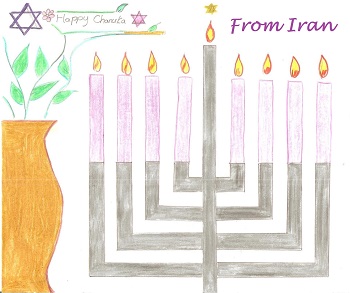Lesson from Hanukkah to Publicize the 7 Laws
Excerpt from a talk by the Lubavitcher Rebbe, Rabbi Menachem M. Schneerson, Hanukkah 5745 (19’84).*
The Haftarah reading [from the Prophets] on …Hanukkah emphasizes the importance of influencing Gentiles. In this Haftarah it is written: “Many nations will attach themselves to G-d on that day, and they will become a nation for Me.”[1] The Haftarah begins by mentioning the Jewish people. It says, “Sing and rejoice, daughter of Zion, for I [G-d] am coming, and I will dwell in your midst.” [2] Yet concludes with the above verse concerning the Gentile nations.
This is the connection [of this Haftarah] with Hanukkah. It is said,[3] “light [the Hanukkah candles] at the opening [of the home] next to the public domain, [to shine] on the outside.” …[The purpose is] to transform [spiritual] darkness into light. …This is the meaning of [the quoted verse], “Many nations will attach themselves to G-d.’ ” Obviously, the prophecy, “Many nations will attach themselves to G-d,” is brought about through the Jewish people fulfilling the command “to compel all the inhabitants of the world to accept the commandments given to Noah’s descendants… because the Holy One, blessed be He, commanded them.”[4] This compelling should be applied verbally, and, of course, in a pleasant, peaceful manner… [which] will lead to far greater success.

However, a question may be asked. This prophecy was said concerning the Messianic Era. Numerous other similar prophecies exist, beginning with that of Isaiah, “the prophet of deliverance,” who declared, “Many nations will go and say, ‘Come, and let us arise to the mountain of G-d… and He will teach us His ways.’ ”[5] If so… why must a Jew occupy himself with teaching Gentiles? Has he not been assured that this prophecy will be fulfilled in the Messianic Era regardless?
Promoting the Seven Laws is a Divine command from the Torah
The answer to this is simple. Rambam rules clearly, “Moses was commanded by the Al-mighty to compel all the inhabitants of the world to accept the commandments given to Noah’s descendants.” This command was issued alongside all the Torah’s other commands. Additionally, this concept is alluded to in these very prophecies. The word Torah [in Hebrew] is etymologically related to the Hebrew word hora’ah, lesson.
Thus, all Torah concepts are a lesson for us. It follows that these prophecies also serve as a lesson for every Jew’s Divine service. They teach that a Jew ought to do everything in his power to bring the world to a state in which “many nations will attach themselves to G-d.” [This is done] by influencing them to adhere to the Noahide Code. Moreover, this effort will hasten the complete fulfillment of this prophecy in the Messianic Era, just as all the revelations of the Messianic Era depend upon “our actions and our service throughout the exile.”[6]
The connection with Hanukkah
…This is the lesson from the theme of Hanukkah, a lesson also emphasized in the Haftarah of the Sabbath of Hanukkah. A Jew must do everything in his power to illuminate the “outside” [i.e., a realm distant from G-dliness]. This means influencing Jews who are found, at least superficially,[7] on the “outside” and bringing them to shine through observing the Torah and mitzvos, such that even on a revealed, external level their identity as “an entirely golden candelabrum”[8] will be recognized. It also entails influencing Gentiles to adhere to the Noahide Code. That will bring “the feet of the ‘Tarmudai people’ to cease [from the streets].” [This is a euphemistic reference to people who rebel against G-d].[9] This is identical to the theme of the verse, “Many nations will attach themselves to G-d.”
…Thus, we are now emphasizing again how needed and essential this activity is, especially on the Sabbath of Hanukkah, for the lights of Hanukkah represent that “the feet of the Tarmudai people cease,” i.e., the preparation for the Messianic Era, when the prophecy, “Many nations will attach themselves to G-d,” will be fulfilled.
Footnotes
*From the book To Perfect the World: The Lubavitcher Rebbe’s Call to Teach the Noahide Call to All Mankind. Translated by Rabbi Yehoishophot Oliver. Posted on Asknoah.org with permission from the publisher, Sichos In English.
[2] Ibid., 2:14.
[3] Tractate Shabbos 21b.
[4] Mishneh Torah, Laws of Kings 8:10-11.
[5] Isaiah 2:3; Michah 4:2.
[6] Tanya, Likkutei Amarim, ch. 37.
[7] For deep down, every Jew desires to perform the will of G-d. (Mishneh Torah, Laws of Divorce, end of ch. 2).
[8] Zechariah 4:2.
[9] This reference to “the Tarmudai” people is related to the law that one may light the candles of Hanukkah until the people from Tarmud, who used to sell wood in the marketplace, had gone home. For every night they would continue to peddle their wood until everyone else had gone home and checked whether they needed wood for their fires. After that time, the streets were empty, and there was no one left outside for whom the Jews in their homes could publicize the Hanukkah miracle, by lighting their menorahs to shine into the streets. Cf. Shabbos 21b.
On a deeper level, the word Tarmudai is related to meridah, rebellion, and represents rebellion against G-d. Thus, the Hanukkah candles are said to have the effect of removing rebellion against G-d in the world at large. They are thus comparable to disseminating the Noahide Code, which has the same effect.








